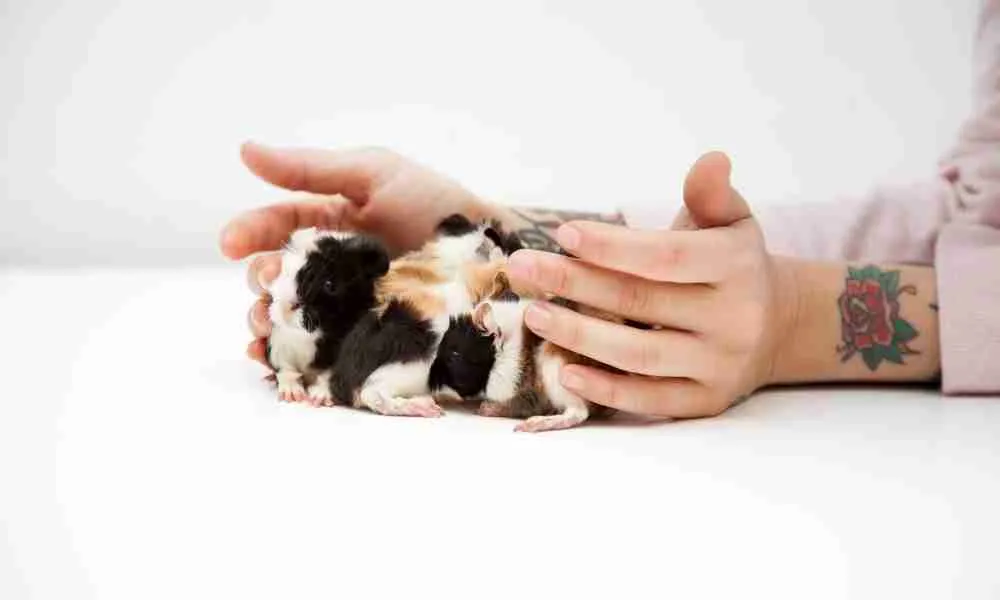Many people around the world today now raise guinea pigs as pets. However, as a beginner, taking care of newborn guinea pigs can be confusing and stressful.
If your cavy is pregnant, and will deliver soon, a beginner’s guide to newborn guinea pigs is all you need!
In this article, I’ll teach you the main things to know about newborn cavies. These include what to do with the babies, how to feed them, ways to take care of them, and other information.
Now, let’s move on!
Table of Contents
What are Guinea Pig Babies Called?
Commonly, a guinea pig baby is known as a pup. If the mother guinea pigs give birth to more than one baby, then they are called pups. Female guinea pigs are known as sows while the males are called boars.
A female guinea pig’s pregnancy period lasts for 59 to 72 days and delivery is always easy and fast.
That is if she is over 3 months and less than 10 months as this is the best time for breeding female guinea pigs.
Usually, a mother guinea pig can give birth to between 1 or 8 pups at a time but the average litter per birth is 2 to 4. In a year, female guinea pigs can give birth to about 5 litters due to their high reproductive rate.
What Do First-born Guinea Pigs Look Like?
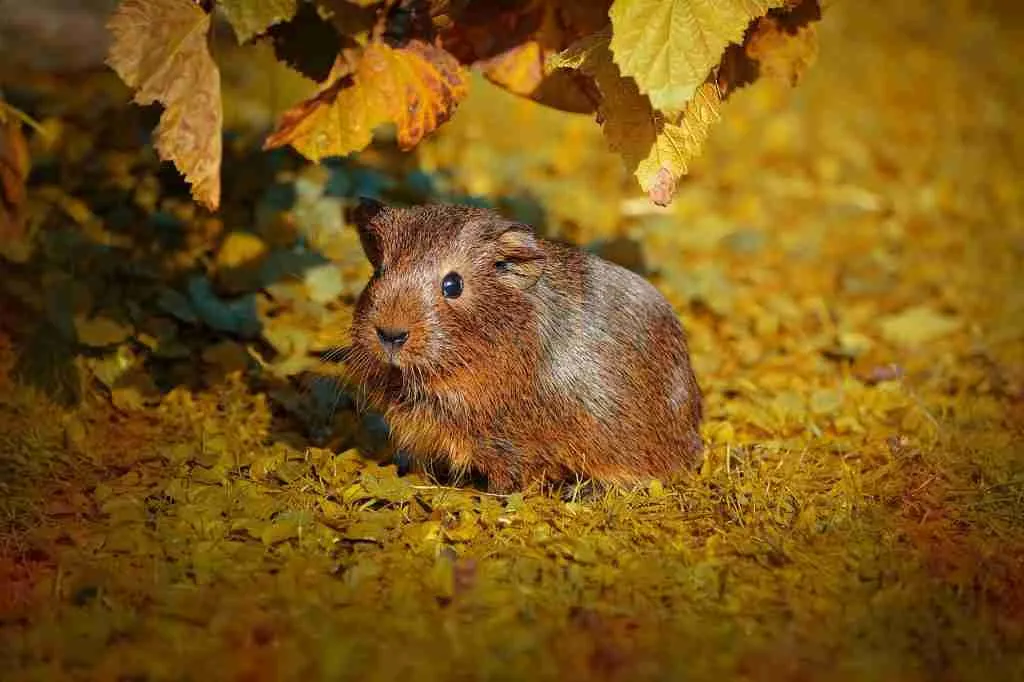
Firstborn guinea pigs look exactly like their parents, depending on their breed.
At birth, pups are precocial, which means they can see, hear, walk, and have teeth and furs. Also, guinea pig babies usually weigh between .15 to .25 lbs (70 to 115g) depending on the number of litters (babies per birth).
If the mother guinea pig gives birth to small litters, the pups will be bigger but if otherwise, the pups will be smaller in size.
What Do Baby Guinea Pigs Sound Like?
Baby guinea pigs make small noises as their voice is not yet loud enough. Both the mother and babies frequently share squeaks and chirps to check up on one another.
But as they grow older, they’ll begin to chatter their teeth, wheek, coo, and make other noises.
All the sounds pups make have special meanings. Let’s take a look at some baby guinea pig sounds and what they mean:
- Wheeking
This is a loud whistling sound that guinea pigs make when they are happy. A baby guinea pig will likely wheek when you’re bringing her food or if she needs your attention.
- Purring
This is a high or low pitched sound that guinea pigs make when you’re grooming or petting them.
Often, this is a sign of satisfaction in cavies, but it can also mean they are going through stress if the pitch becomes suddenly loud. Purring is also known as bubbling.
- Cooing
Whenever guinea pigs coo, they make soft sounds that are the same as murmuring. Male and female cavies coo as a way of showing love to one another.
Mother guinea pigs make the cooing sound to calm her babies.
- Teeth chattering
As a sign of aggression or anger, guinea pigs chatter their teeth. It is a strong message to other guinea pigs that they should stay back or else a fight will soon start.
Keep the angry guinea pig in a separate cage for a while to prevent him from attacking others.
- Whining
This is a high-pitched sound that guinea pigs make whenever they are sick, in pain, or angry.
Whenever your small pets make this sound, check for signs of discomfort in the cage and if there is none, visit your vet.
- Hissing
Another squeaky high-pitched sound that guinea pigs make when they are angry is hissing.
They might be angry with one another, likely feeling hungry or not comfortable. Just know that cavies do not hiss without any reason.
- Rumbling
A rumble sounds just like purring but is usually deeper. Male guinea pigs make rumbling sounds to attract the females. Funnily, the female cavies rumble too to gain the attention of the males for mating purposes.
READ ALSO: GUINEA PIG NOISES AND WHAT THEY MEAN
What Do You Do with a Newborn Guinea Pig?
Knowing how to look after a newborn guinea pig plays a great role in their survival. They are still small, weak, and can be easily exposed to certain risks.
To be on the safe side, take note of the following questions to avoid making mistakes while taking care of your newborn cavies:
Is It OK to Touch Newborn Guinea Pigs?
Yes, there’s nothing wrong with touching your newborn guinea pigs. Still, it is better to allow them to spend lots of time with their mother.
This way, the pups will be able to bond well with her.
Picking up the pups all the time is not a great idea because the mother can reject them in the long run.
Ensure you don’t scare the baby cavies while trying to handle them and hold them carefully. Doing this will make them feel free and safe whenever you’re around.
What Do You Feed Newborn Guinea Pigs?
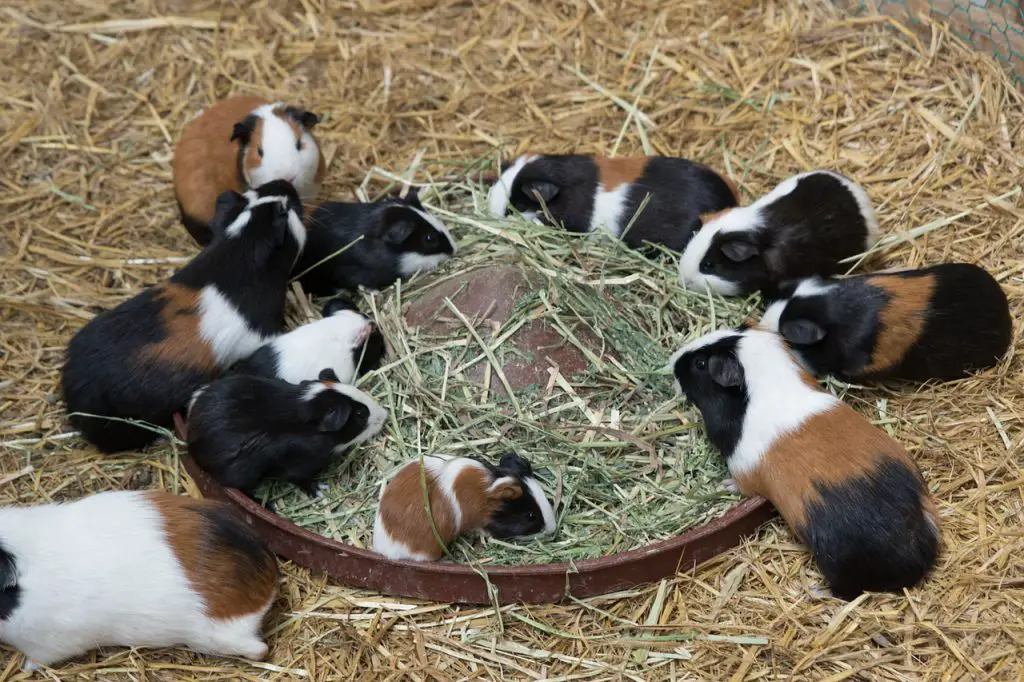
You’re free to feed your baby guinea pigs the following:
- Hay
- Pellets
- Highly nutritious fruits
- Vegetables
Note that pups can eat the same diets as adult cavies, so you don’t need to worry about feeding them special diets.
Just ensure their diet is rich in vitamin C, as they cannot produce it, and also contain calcium to build strong bones and teeth.
Always remember to remove leftover food from their cages to prevent bacteria from acting on it.
Feed the pups at least two times a day so that they can gain nutrients from other sources besides breast milk. Furthermore, provide clean water only for these baby cavies all the time.
What Kind of Milk Do You Feed a Baby Guinea Pig?
Usually, newborn guinea pigs feed on their mother’s milk for some days before eating solid diets. Nevertheless, you can feed them:
- Goat milk
- Diluted evaporated milk
In a case whereby the mother guinea pig doesn’t feed the pups, you’ll need to provide milk for them every one hour.
Feeding should be done carefully with a small spoon to prevent health dangers.
Another option is to drop biscuits or bread in the milk before hand-feeding the baby cavies so that they can suck the milk out of it.
Do Newborn Guinea Pigs Drink Water?
Yes, newborn guinea pigs can drink water just like adults. At that stage, the newborn hardly gets thirsty because they get breast milk from their mother.
But as their daily dietary intake increases, and as they watch how their mother drinks water, they’ll start to do the same.
How Do You Care for Newborn Guinea Pigs?
Usually, mother guinea pigs take care of their newborn naturally. Regardless, you can offer support in one way or the other. Doing this will help the babies grow happily and healthy.
Here are 6 ways to care for newborn guinea pigs:
Keep them in a Comfortable cage
Prepare for the arrival of the pups by providing a comfortable living environment for them.
This means that you should make sure their cage is of moderate temperature and doesn’t contain a wide hole by which they can escape.
In addition, keep the newborn in a quiet environment as noises can make them afraid and begin to hide.
Handle the Pups Early
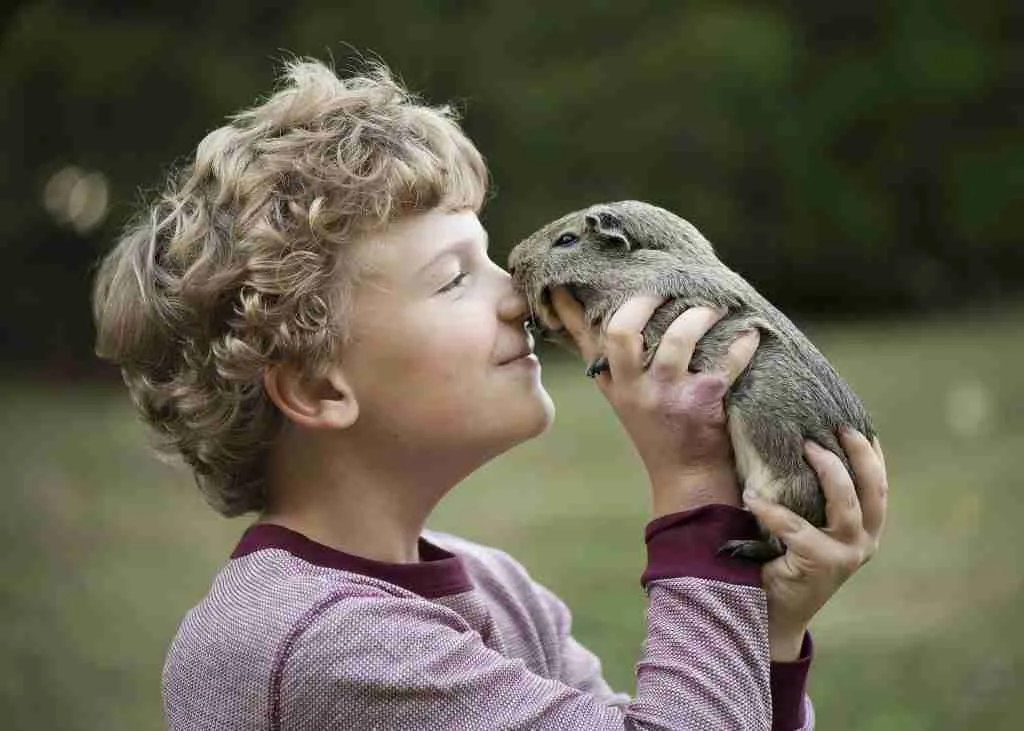
Try to hold the newborn pets as soon as possible so that they can become used to relating with humans.
Carefully handling the pups once in a while will allow them to become social quickly and even enjoy the company of their owners.
Understand early that guinea pigs are not comfortable with the human touch, especially for the first few times, and will be afraid.
Avoid carrying them carelessly while entering their cage and do not let your presence scare them. With time, the newborn guinea pigs will accept you and even want you to hold them regularly.
Provide Healthy Diets Only
Fortunately, baby guinea pigs are not choosy about diets; they eat the same diets as adults.
Always feed them fresh fruits, vegetables, hay, pellets, and clean water. But don’t overfeed the small pets as it may cause diarrhea or stomach problems.
While serving your pups food, remember that quality is more important than quantity.
Similarly, watch the babies’ reactions after feeding them a new diet so that you can take quick action if anything goes wrong.
Check for Symptoms of Illnesses
Regularly watch out for anything different in your baby guinea pigs such as:
- Diarrhea,
- Swollen joints,
- Loss of appetite and more.
Every day, baby guinea pigs are at risk of having one illness or the other and should be given attention. For example, a lack of enough vitamin C in their diet can cause scurvy.
Whenever you notice symptoms of diseases, call your vet doctor immediately.
Buy Toys
Keep your pups active all day by providing toys for them. If possible, make the toys for them; it won’t take time. And if you’re very busy, get a few of the toys from the pet store.
Constantly allowing your baby guinea pigs to play around their cage will prevent boredom and its aftereffect – stress.
Maintain Good Hygiene
A clean living environment plays a key role in your pups’ general health. Create a plan of the days you’ll always take care of their cages every week.
Remove all leftover food, change their bedding, sweep everywhere and do everything necessary to make the cage clean.
Allowing your guinea pigs to live in a dirty environment will expose them to the risk of illnesses and diseases.
It is better to prevent diseases in your small pets than to be taking them for treatments. Consider time, money, and your tiny pets’ health whenever you don’t feel like cleaning their cage.
How Do You Tell If a Baby Guinea Pig is a Boy or Girl?
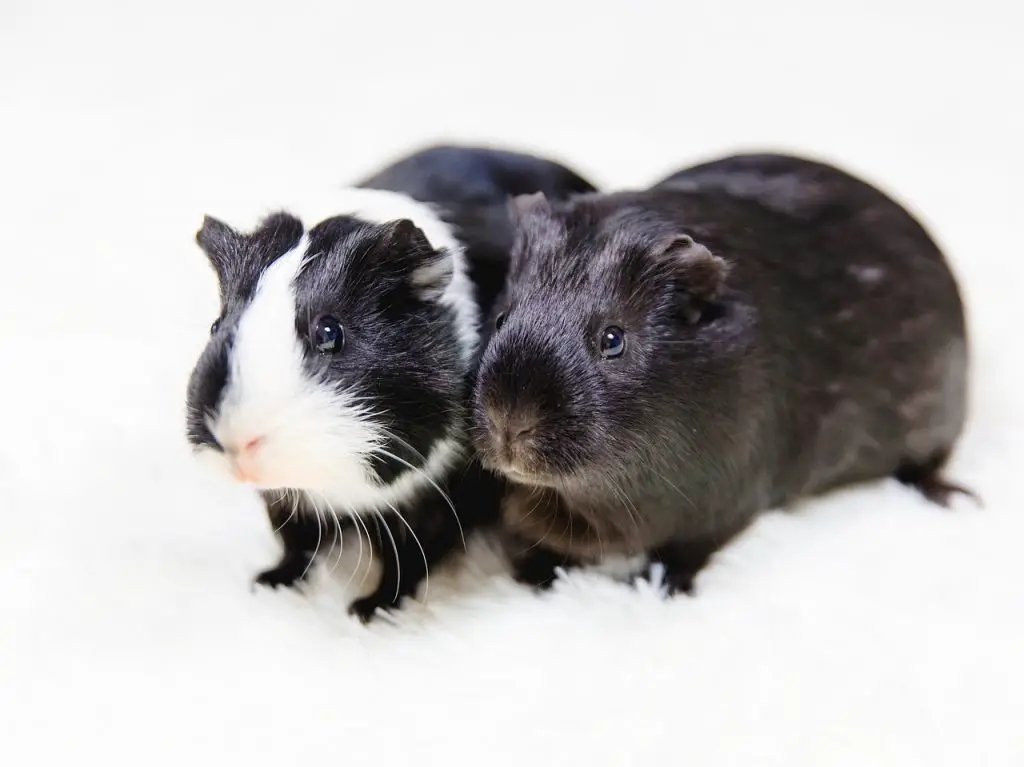
To know whether a newborn guinea pig is a boy or a girl, consult with your vet doctor. It would be easier if they were adults and sexually mature.
All you’ll have to do is to check their sex organs for differences by laying the guinea pigs on their backs.
But it is not advisable to lay baby guinea pigs on their backs as they are still tiny and can get hurt easily.
Identifying the gender of your baby guinea pigs is important for 2 major reasons:
- Female cavies, for example, are calm and often live together more peacefully than males.
- Both male and female guinea pigs mature sexually at around 3 weeks and the females can get pregnant while nursing babies.
So, it is always better to get an expert opinion on whether baby guinea pigs are males or females so that you can separate them early.
READ ALSO: WHAT GUINEA PIGS CAN LIVE TOGETHER?
Choosing a Baby Guinea Pig Name
Guinea pigs are cute and deserve cute names. However, coming up with names can be difficult, especially if the number of babies is more than you expected.
Naming your guinea pigs plays an important role in training them and also in calling them out among other pets.
For example, if one of your cavy’s name is honey, you can easily train him by using words like “Honey, don’t leave this place” or “Honey, it’s lunchtime” and so on.
Luckily, your cavies are smart creatures that learn fast but despite this, don’t give them names that are difficult to pronounce.
Have it in mind that they are still animals and will likely not answer you when you don’t name them correctly.
Below are 5 tips that can help you choose the right guinea pig names:
1. Think about names that you and others can easily call out like those with short and meaningful words.
2. Consider names that remind you of something you love like flowers, weather, or nature.
3. Study your guinea pigs’ behaviors to name them; it helps sometimes.
4. Avoid giving them insulting names.
5. Make sure you don’t give your pets names you’ll have to keep changing later because of one reason or another; it may confuse them.
Whether your guinea pig is a boy or girl, plan to give them amazing names.
If you’re still trying hard to name your tiny pets and nothing comes to mind, then check out these 149 best guinea pig names and choose whichever ones you love best.
Trust me, naming your pets will be easier and faster!
Related Questions:
Do Guinea Pigs Eat their Babies?
Yes, guinea pigs can eat their babies accidentally but it is not common. This type of situation can happen if the mother guinea pig is very hungry or when eating her baby’s placenta.
As a pet owner, always provide enough food for mother guinea pigs because they are nursing and tend to become hungry and thirsty quickly.
Another uncommon situation is when male guinea pigs eat babies too. But this only happens if the baby doesn’t belong to them.
Can The Father Guinea Pig Be With The Babies?
Yes, the father can be with the baby guinea pigs but only for a short period.
Allow the babies to spend quality time with their mother for some weeks so that she can bond with them and also nurse them well.
Allowing the father to stay with the babies can cause the mother to lose focus on the baby’s cavies.
In addition to these, if the babies are females, the father can impregnate them once they are 21 days old and even get the mother pregnant too.
If this happens, both mother and children will be at risk of serious health problems.
To prevent this type of situation from happening, don’t allow the father guinea pig to spend much time with the babies.
How Long Does a Baby Guinea Pig Need to Be with Its Mother?
Normally, female baby guinea pigs should spend at least 4 weeks with their mother while the males should spend 3 weeks.
During this period, they’ll have the time to bond with one another and the mother will also feed the babies milk regularly.
After 3 weeks, separate the male cavy from their mother because they can get her pregnant at that age.
Can Newborn Guinea Pigs Survive Without Their Mother?
Yes, newborn guinea pigs can survive and live well without their mother. Sometimes, the mother guinea pig rejects her babies, especially if you don’t allow her to spend much time with them.
If issues like this happen, you’ll need to make sure the babies don’t feel lonely, hungry, or thirsty.
After three weeks, you are free to take care of the baby guinea pigs like adults.
Nevertheless, it is always better to allow the mother to care for her babies; nothing can replace her care.
Final Thoughts
All we’ve talked about in this guide is that taking care of newborn guinea pigs, especially as a beginner, is simple as ABC.
However, you need to gain useful knowledge about it before you take this important action.
We also mentioned that you should separate the male cavies from the females once they mature sexually.
Feed both mother guinea pigs and her babies diets rich in vitamins, most importantly vitamins C and calcium. Avoid scaring the babies and handle them carefully to build trust with them.
Finally, allow the babies to bond with their mother for at least 3 weeks. Do not forget that motherly care, love, and attention are important for all newborn pets.
Did you find this article interesting and helpful?
Kindly share with friends on social media so that they can learn too!
